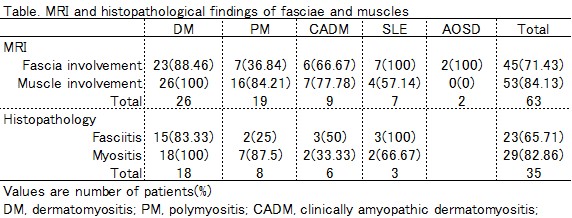Session Information
Session Type: ACR Poster Session A
Session Time: 9:00AM-11:00AM
Background/Purpose: We previously reported that inflammation
occurred early in the fascia of patients with dermatomyositis. We often
encounter patients with autoimmune diseases who present with muscle symptoms, such
as pain and weakness and biopsies of the affected muscle areas do not show
inflammatory cell infiltration among the muscle fibers, thereby leaving the
cause of these symptoms unclear. To date, the work-up for autoimmune disease
patients presenting with muscle symptoms has focused on the presence or absence
of muscle fiber inflammation, and not on the presence or absence of fasciitis.
Therefore,we thoroughly investigated the lesions of fasciae and muscles in
patients with muscle symptoms and elevated muscle enzyme levels.
Methods: This study included patients with autoimmune diseases who
presented with myalgia, muscle weakness, or elevated serum levels of muscle
enzymes (CK and aldolase), and were admitted to the Division of Rheumatology of
Jikei University School of Medicine Hospital between April 2007 and December
2013. They underwent magnetic resonance imaging (MRI) and en bloc
biopsy.
Results: Sixty-three patients presented with myalgia, muscle
weakness, and elevated levels of muscle enzymes (CK and aldolase), and
consisted of 26 with dermatomyositis (DM), 19 with polymyositis (PM), 9 with
clinically amyopathic dermatomyositis (CADM), 7 with systemic lupus
erythematosus (SLE), and 2 with adult-onset Still’s disease (AOSD). MRI was
performed in all sixty-three patients. Fascia involvement was observed in 45
(71.43%) of patients : in 23 (88.46%) out of 26 with DM, 7 (36.84%) out of 19
with PM, 6 (66.67%) out of 9 with CADM, all 7 with SLE, and all 2 with AOSD. Histopathological
examination was performed in thirty-five patients. Fasciitis was observed in 23
(65.71%) of patients�Fin 15 (83.33%) out of 18 with DM, 2 (25%) out of 8 with PM, 3 (50%)
out of 6 with CADM, and 3 (100%) out of 3 with SLE. Many patients with
fasciitis also had myalgia. However, myositis was not associated with myalgia.
Muscle weakness was not associated with fasciitis. A high percentage of
patients with normal serum CK levels and elevated serum aldolase levels,
developed fasciitis.
Conclusion: Fasciitis occurred in patients with various autoimmune
diseases. Patients with myalgia may have fasciitis in autoimmune diseases.
To cite this abstract in AMA style:
Noda K, Yoshida K, Ukichi T, Furuya K, Hirai K, Kingetsu I, Kurosaka D. The Fascia Is a Target Organ of Inflammation in Autoimmune Diseases [abstract]. Arthritis Rheumatol. 2015; 67 (suppl 10). https://acrabstracts.org/abstract/the-fascia-is-a-target-organ-of-inflammation-in-autoimmune-diseases/. Accessed .« Back to 2015 ACR/ARHP Annual Meeting
ACR Meeting Abstracts - https://acrabstracts.org/abstract/the-fascia-is-a-target-organ-of-inflammation-in-autoimmune-diseases/

